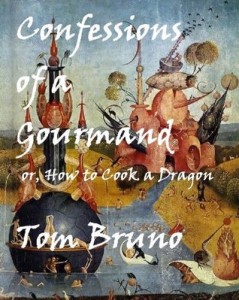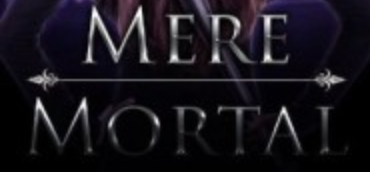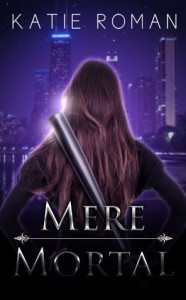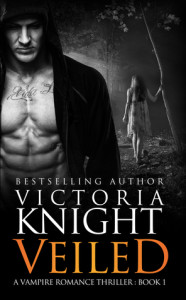I downloaded Tom Bruno‘s foodie novel, Confessions of a Gourmand, or How to Cook a Dragon from the Amazon free list.
Description from Goodreads:
Van d’Allamitri is destined to become the most famous chef in all of the Three Continents– if only he can survive his childhood first! Son of a Shan-li restaurateur and a far trader from the great merchant city of Varo, young Van proves to be a natural talent in the kitchen, transforming the simplest of ingredients into delicious meals capable of enchanting the hearts of those who eat them. But when disaster strikes and the hated Varonians invade his sleepy home village, Van must choose between honoring the culinary traditions of his mother and following in the footsteps of his cosmopolitan but ne’er-do-well father.
Armed with his trusty chef’s knife and an enchanted wok containing the trapped soul of his ancestor, Van will cook many meals and face many dangers– from treacherous slavers and bloodthirsty mercenaries to the Gorgon Queens of Chocolate and their terrible reptilian pets– all the while unraveling the mystery of his father’s past and setting into motion an explosive confrontation between his people and a powerful empire. Confessions of a Gourmand is a novel about family, fantasy, and food set in a deliciously imagined world where dragons are not only real, but on the menu as well.
Review:
Most famous chef in the known world and his autobiography ends 17? I’m just akin’ ’cause, you know, seems maybe something got left out. No really, he’s writing this history as an ‘old man’ but it only covers birth to 17. Where are the next, oh, 50-80 years? Ok, I’m being overly critical and maybe a little priggish, but I’ve got a point right?
Now about those first 17 years…they’re pretty awesome. In the tradition of epic tales everywhere, Vin manages to heroically be in the right place at the right time (It’s actually often the wrong place at the wrong time, but who’s counting?) to make friends and influence people. By age six, he’s garnering the attention of kings, by mid-adolescence he’s wooing queens and rescuing the huddled masses and by 17 he’s changing local history and striking out on his own. Cool.
By 17 I’d paired combat boots with my minidress and silently dared my father to oppose my free expression of prescribed fashion anarchy. So, I’m duly impressed with Vin’s accomplishments. There were some definite, ‘well wasn’t that convenient’ moments, but they were generally overshadowed by my basic enjoyment of the tale and Vin’s voice.
The story is marinated…no, narrated in a marvellously conversational tone, by an eminently likeable main character. Vin’s willingness to admit to his own faults makes him hard to resist and Bruno’s ability to somehow thread Vin’s narrative with subtle emotional shifts made it feel real, despite it’ fantasy setting.
The book does drag in the middle. Counterintuitively, this is when Vin ages past his culture’s version of childhood, leaves home for the first time, travels, discovers women, etc. You would think this would be where the book picks up. But no, I found his six-year-old self more interesting than his older self (at least until the very end, when the pace accelerated again).
Part of the reason is that as a child he didn’t have enough life behind him to allow for flashbacks. As he aged, these flashbacks became more common and (I found) distracting. Especially as they were often interspersed with other narratives, going back and forward between two memories/tales with no indication or visual transition. Meaning you didn’t realise you’d shifted from the primary event to the secondary event until a sentence to two into the new paragraph. Annoying.
Another reason is the inclusion of at least one lengthy recipe, if not an entire multi-course menu description in each chapter. I found it stifling by the latter half of the book. Both because the pattern became so apparent and because as he aged his cooking grew more complex and took more time to explain.
However, even throughout the slow bits I found plenty to appreciate. The almost recognisable cultures Vin describes (certainly I saw China and Italy, possibly Japan and Spain) were interesting, while the completely imaginary ones (the Gorgon queen of Chocolate, for example) tickled my fantasy-fancy. Because lets not pretend that Vin’s focus on food wasn’t also a convenient hook to discuss the politics, histories, mores, habits and customs of the different peoples’ haute cuisine he cooks so well. (And all of it is surprisingly well thought out.) All this before I even scratch the surface of dragons, wyrms, dinosaurs, cyclops, shark-shifters, etc. One is never sure where myth leaves off and reality begins, but one always enjoys the story.
My one main complaint about the book, however, is that Vin’s age is largely indeterminate until very late in the game (like 95% through). This is both a symptom of and a cause of the fact that you’re never sure how much time is or has passed. At one point, I thought him 8-9 years old only to have him referred to as a child and taken as a lover within the same few pages. He eventually refers to his ‘not yet 16 year old self.’ Would that make him 15? I guess that’s better than the 12-13 I’d guestimated when It became apparent he was no longer a child-child and was being taken to the bed of a significantly older woman.
Either way he’s under age and having sex. This didn’t particularly bother me. I’m flexible enough to roll with cultural difference concerning age of adulthood/consent and there is no graphic sex anyway, but some people might be bothered. Me? I was just annoyed because I didn’t know if I should be picturing a short, juvenile boy with a sparklingly clear voice or a gangly, gravel-voiced adolescent. These things are important to a visually prone reader!
All in all, I’m closing this book happy. I thoroughly enjoyed following Vin’s adventure and will happily pick up another of Bruno’s works.




